
Mar 27, 2015 | Non categorizzato

Istanbul: Patriarch Bartholomew does the honours in the Orthodox church of Aya Strati Taksiarhi, at an event involving more than a hundred representatives from the Orthodox and Catholic world, marking the 7th anniversary of Focolare foundress, Chiara Lubich. Attendees included the Metropolitans Ireneos, Apostolos and Elpidophoros; two Archimendrites, Father Vangeli who translated the books from Greek into Turk; and the Great Archimendrite Vissarion. Also attending: Armenian Catholic Archbishop, Levon Zekiyan and the Catholic Bishop, Louis Palâtre, as well as many others. The books were presented by Maria Caterina Atzori, linguist from the Focolare’s Centre for Studies who translated the books into Greek. The moderator was journalist Nikos Papachristou from Athens.
“During the course of the centuries, the divine epiphany of the Lord has been manifested in many ways, so that the human family could understand the things of God,” the Patriarch exhorted, after he opened the event with a prayer for Chiara, and intoning the hymn to the Holy Spirit. “He has never tired of raising up holy men and holy women who, through their example, with their love founded on divine philanthropy, and with their word inspired by the Holy Spirit, have continually solicited a metanoia, a conversion of heart for the whole of suffering humanity.”
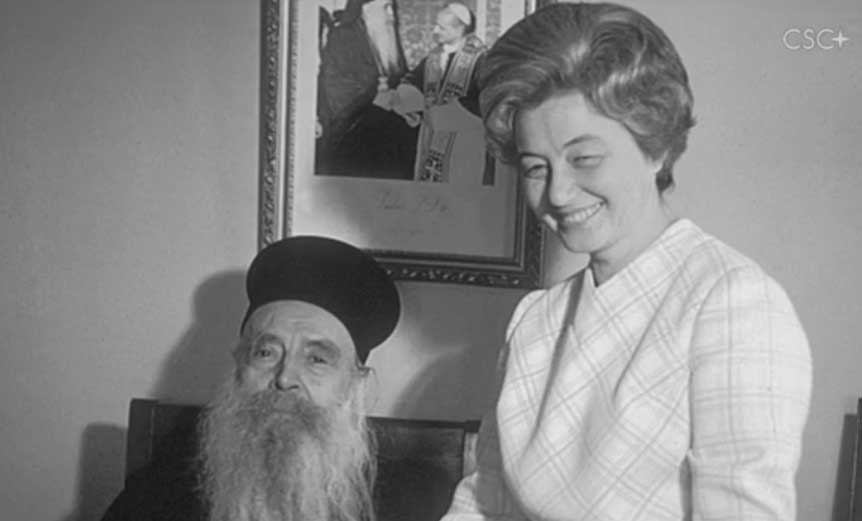
Video “Atenagora, Paolo VI and Chiara Lubich”
In his speech, he described the spiritual figure of Chiara, beginning with his direct testimony as an eye witness of the encounters between Chiara and Patriarch Athenagoras: “How could one not embrace the Wisdom of God in the blessed work that our sister Chiara has offered to our Churches, to our societies and to all people of good will? She whom our beloved Predecessor (. . .) lovingly called Tecla, the disciple of Paul, the woman who is equal to the Apostles.”
Then he outlined the salient points of the path of spirituality that she opened in the Church and beyond: “Gentle Chiara had answered God’s call, being totally conformed to her Master, but especially allowing herself to be made into a vessel that offers salvation, in order to bring all to Christ. Her life was spent in finding paths of encounter and dialogue with everyone, distinguished by a profound respect for every culture in which she knew how to conduct a journey of encounter, mutual understanding and mutual collaboration.”
“Chiara Lubich began her life journey, dedicated to the Lord, in the suffering of war. In this suffering she lived the Jesus Crucified and Forsaken, and understood that there is no Resurrection without passing through the downfall. And the suffering of Christ became her personal suffering, but never despair.”
“Her life was characterised by a zeal for Holy Scripture which, in her, became founding Word, living and exhilarating. She lived the Lord’s commandment to its depths: “As I have loved you, you should also love one another” (Jn 13:34). To the point of infecting countless people with this love, different among themselves, but united in a concrete ideal of communion.
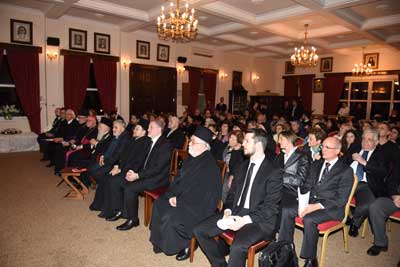 Chiara was ever faithful to her Church. And in this conviction, she felt the drama of the division, of the impossibility to receive from the same Chalice.
Chiara was ever faithful to her Church. And in this conviction, she felt the drama of the division, of the impossibility to receive from the same Chalice.
Perceiving the cry of suffering because of the laceration, she offered herself entirely for the charism of unity, becoming its instrument in the hands of God in meeting the heads of Churches and simple faithful. But she did not stop there: she sought, urged and invited us to find new paths of communion.”
“Chiara had a totally particular love for the Holy and Divine Eucharist of the Lord. In the Eucharist she perceived the gift of love from the One who was offered once for all, to draw man to himself. We can say that in her a Eucharistic conscience of unity was formed.” “There is still another aspect that we can see in the work of Chiara: the Unity of the Trinity, through the Eucharist, passes into the family (. . .) The place where mutual love can shine, which joins its members in a totally natural way (. . .) And in this context, the unity of the human family can be glimpsed in all of its aspects, in the society, in politics, in economy, in respect for the work of God for each one of us singularly and in all of His marvelous creation. The message and work of Chiara, therefore, turn out to be ever timely, especially with regards to the global context in which we are living.”
Hence, “the gift that the Focolare Movement today offers in presenting Chiara Lubich in the Greek language is particularly appreciated. We welcome it as a gift amongst brothers and sisters, which will surely be appreciated also by the Greek public. To the Greek-Orthodox faithful this wondrous message of unity and love!”
In conclusion, he turned directly to Chiara that she might intercede “so that the dawn of a new day for this wounded humanity might soon dawn, and that the sentiments for which she had spent her entire life, would produce abundant fruits, wherever today we do not find anything but darkness and bloody martyrdom.”
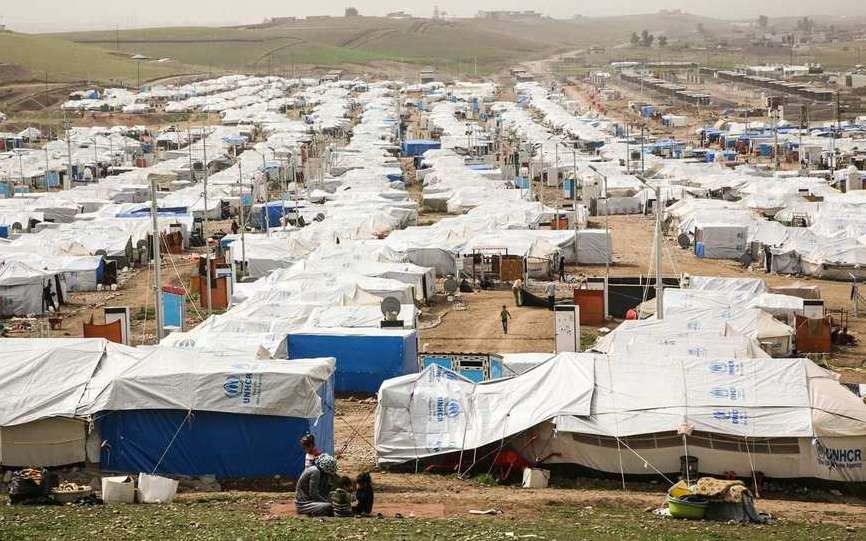
Mar 26, 2015 | Focolare Worldwide

“I live in Erbil, northern Iraq, where I began a school for Kurdish children in 2010,” says Malu Villafane, who born in the Philippines. For the past few years I have been working in a local sanctuary, organising activites and projects. Last August, the shrine was turned into a refugee camp. The cities of Sinjar and Mosul, along with adjacent villages like Qaraqush, Aaramlesh, Bartalla and others, had been invaded by ISIS. The inhabitants fled leaving everything behind, and they took refuge in Kurdistan, with us. There was a very heavy atmosphere in the camp, so much pessimism, children lost and abandoned. Together with the people in charge of the centre, we started up some activities for the teenagers and children, which also involved some of my colleagues from school.”
Over the years, how have Christians, Muslims, Yazidis and other ethnic groups coexisted, such as the Kurds, Turkmen, and so on?
“They respected each other, and did everything together. I work with the Kurds, Turkmen, Arabs and other foreigners. During the crisis many Kurds hosted refugees in their own homes. The Kurdistan people don’t condone this massacre.”
When did the refugee crisis begin in Erbil? Where did they settle? What will they do over the next few months?
“The crisis which caused this forced migration already began in June 2014 and worsened at the beginning of August. The people lost everything: home, work, school. Many of them first took refuge in empty buildings, churches and on the streets. When they could, they stayed with relatives in Erbil. Many non-profit organisations, along with the Church, had to respond to the crisis without any time to prepare. They were in need of everything! Working together we were able to collect a lot of basic necessities. During that period, the temperature rose above 50°C, infernally hot. Now, during the winter it is quite cold. There are not enough tents to house the thousands of families. There are camps without food and water for extended periods of time. Yet, after a few months, the children began to smile and play, to experience something outside the camps, like visiting the swimming pool or public park. The parents see their children’s joy, and rediscover hope. They’ve begun to clean the camp, to cook and give a hand.
After living in this dramatic situation with them, my life was turned upside down. My stay in Iraq took on a very deep meaning: I was living for universal brotherhood.
But does it make sense to work for brotherhood? What pushes you to go on working in the camp?
“If I look at the situation from a human point of view, I become discouraged and feel like escaping. But, if I look at it with the eyes of a hope based on faith, I’m able to go beyond all the suffering I see. I think of the words of the Gospel: “When I was hungry, you gave me something to eat; when I was sad, you comforted me. . .” These words give me strength to face the daily difficulties that I encounter in the camp. It’s not easy to describe all the suffering there is; many of them have lost hope, lost everything. This experience has expanded my heart to welcome everyone as a brother, a sister. It has enabled me to come out of my own comfortable little world and serve others. I want to live for universal brotherhood not because it solves problems, but because, one step at a time, it’s like planting a seed. Peace mostly grows from the small things we do for one another each day.”
What can we do from where we are, to be near to these people?
“I think we need to begin by confronting the topic of “disinformation.” Even though the emergency continues, hardly anyone speaks of it. Spread a culture that welcomes and listens, especially amongst the different races and religions of your cities; promote activities and projects that break down the walls. I thank all of you for your help, and may we continue to believe that Peace is possible.”
Source: Umanità Nuova online
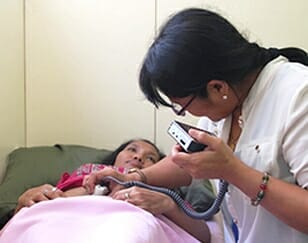
Mar 25, 2015 | Focolare Worldwide
 Working here
Working here
“Being doctors here in the Philippines where there is widespread poverty, my husband and I set up a modest private medical clinic in our small house. It’s certainly was not easy thinking of our colleagues who all have careers in the West. At times we ask if we did well to stay here. But the thought of so many needy people among our own people – children in need of medical care, married couples in need of guidance, the elderly with terminal illnesses. . . The Gospel motivates us to give a personal contribution towards improving society beginning from our own land.” L. R. – Philippines
Moses drawn from the street
“A large family: six children and one on the way, who then died before birth. The mother was saved, but for several days she lingered between life and death. During those days, some military had taken to the hospital in which she was being care for, a newborn that had been abandonend on the street. After some treatment, he recovered but was in need of a family. He immediately found it in that mother who had lost her child. His new parents named him Joseph-Moses, because the hospital is called St. Joseph’s, and Moses because he had been abandoned and found.”H. E. – Congo
I wanted to have my revenge
“I lost my mother just eight days before my marriage. She had been hit by a car, and I decided to have my revenge. I took a bus to the place where the driver lived. On the way, I recalled some words about love of God and neighbour and, little by little, my anger faded. When the other person saw who I was, he turned pale, but I calmed him: I was there only to find out how the accident had happened. After listening to his story, which he shared amidst tears, I tried to put him at peace and the joy promised by the Gospel accompanied me on the return trip.” F.A. – Rome
Source: The Gospel of the Day – March 2015 – Città Nuova editrice
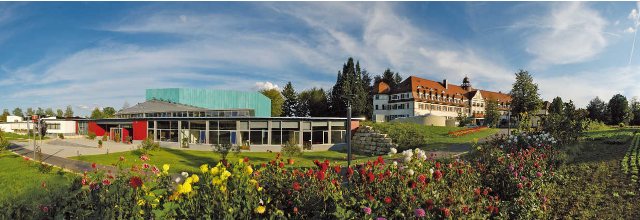
Mar 24, 2015 | Focolare Worldwide

The “Haus Schoenblick” (Schwaebisch Gmuend) Evangelical Training Center
150 heads of evangelical movements and free churches, within the multi-faceted reality of the evangelical world, and with representatives of Catholic movements, posed the query: how to remain faithful to one’s own charism in times of great change?
It is the situation of how various movements that arose over the last century can face the situations today and how they can respond to the various challenges facing Christian ideals, and their searching for new answers, adapted to the times we are living in, though remaining faithful to their roots.
At the “Leaders Convention” Gerhard Pross, moderator and one of the more renowned figures of Together for Europe (network of Christian movements that work together for the benefit of the European continent) and who wanted Focolare President, Chiara Lubich, to be present, as the first successor of Chiara Lubich and as the leader of the Movement.
Maria Voce’s reflection helped to understand the difference between the foundation phases and the “charismatic period,” “full of new, dynamic, luminous surprises,” and the phase of maturity, the “period of creative faithfulness” of a movement, in which, to “grow, develop and multiply” with originality, the inspirational ideas and established by the founder. She went on to recount the Focolare’s commitment to live a widespread leading role of those who live the spirituality and share its aims, and above all, to “go out” more in the “various environments of life and society,” without limiting themselves to living and testifying to unity within the movement, but bringing the spirit and experience of unity to the entire world, “so that all may be one” (John 17.21), the specific aim of the Focolare. “We cannot therefore think of ourselves, Maria Voce affirmed, “we have to “go out” and give of ourselves.” To be able to go beyond ourselves, we need to choose Jesus Forsaken who in his abandonment went beyond himself to unite man once again with God, and unity is one of the main points of the spirituality of unity.
There were members of the evangelical Church, Pentecostal and charismatic movements,
each of which are involved in different way or in social works or on the front of evangelisation, education, political commitment. The “Leaders’ Convention” was created in 1974, well before John Paul II launched in 1998 the communion between movements within the Catholic Church This experience of sharing has therefore continued for some years now. A significant moment which all remembered was in 2000, when with Chiara Lubich at Rothenburg a step forward towards reconciliation was made. In fact the long standing misunderstandings that had developed along the years were cleared up during the “historic moment of mutual forgiveness,” Maria Voce recalled, and which became «a founding experience for communion between movements and communities of different Churches, which later came up with the project “Together for Europe.”
A common step which all look to is the Munich 2016 event, when the “Together for Europe” network will meet for a congress and public manifestation, and will be in turn a step towards the 500th anniversary of Luther’s Reform, offering itself as a prophetic sign of a reconciled and united Europe. On her return from Germany on 4 March, Maria Voce participated in the audience with Pope Francis together with the Bishop-Friends of the Focolare, and conveyed to him the greetings of the 150 representatives of the evangelical movements and their hope in the common commitment for unity. “Very well,” Pope Francis said, when he thanked them. «Your work on the ecumenical front is very important».
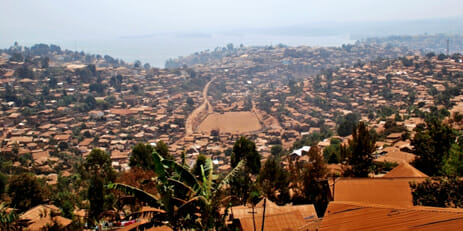
Mar 23, 2015 | Non categorizzato

Bukavu, Democratic Republic of Congo
The Democratic Republic of Congo: a big country with immense natural resources. A population of 72 million with hundreds of ethnic groups. The difficult relationships with the West, the war for the exploitation of minerals, the drama of a forgotten people.
We interviewed the Congolese biologist, Pierre Kabeza, trade union member, a family man who, three years ago, had to leave his city in the Great Lakes region, and who now is at Sophia University Institute.
Why did you have to go on exile, leaving your wife and daughters? Bishop Munxihiwa, bisop of Bukayu who was killed for his battle for justice used to say: «At times there are things we don’t unde stand or see clearly, if not with eyes that have cried.” After his death we were all discouraged but Mons. Kataliko arrived, and decided to follow his footsteps, to speak out in the name of those who have no voice. Kataliko dried the tears of a population which was no longer heeded. On 24 December 1999 he wrote a message denouncing the unjust war, the occupation of Congo by the nearby countries, the exploitation and plunder of mineral resources. This was why they stopped him from doing his pastoral work for 7 months and 20 days. The bells no longer rang. We did sit-in protests every day until he returned to the Diocese. Muslims and Christians of Bukavu, went together to the cathedral where Bishop Kataliko offered mass and forgiveness for those who had made him suffer. He died in Italy a few weeks later.
To continue the work of our bishops – defence of the truth, battle for justice and liberty – a new group, the “Dauphin Munzihirwa Kataliko” (DMK) was formed. The initiatives to fulfil these aims irked their enemies. As head of the DMK, I was involved, together with the group in the field of education, to start with the education of children. The teachers in fact, were not paid by the State but financed by the parents. We took the steps to make the Congolese government assume all its responsibility for the country, and I spoke even to the President of the Republic, reminding him of article 43 of our constitution which recognizes the obligation for children to attend elementary school. He listened but sad to say, up to now nothing has changed. Because of my commitments however, I was threatened, arrested and tortured. My house was attached twice and they destroyed everything. This is why I had to leave to save my life.»
A forgotten war, 6 million dead and 2 million women and children escaping from their villages and cities. What else can you recount?
Yes, also Maria Voce, President of the Focolare said that it seems as if the dead in the “lands far from the Western world” are given less value in terms of humanity and “less political importance, thus weighing less on the conscience of the International community. This is the case of Congo. Our dead are of no interest to the international community because we are at the outskirts of the world. And yet, today, war is a common enemy for all. Mandela taught us that “we were born to be brothers.”
In Europe little is said of the war in Congo, and then without saying the whole truth. It is not only an ethnic war. It’s true that we have many problems in Africa, but I wonder: why is the fire lit only in the rich countries where minerals and oil abound? The situation is always fiery in places where we find coltan, gold and diamonds. And where do all these minerals end up? They are used for smartphones, air bags, navigators and so on. It is estimated that for every kilo of coltan extracted in Congo, two children die. Others are obliged to become “children soldiers.” It would important to let our children know that on using a videogame another child in the peripheries of the world loses his life.»
What does this intellectual and human experience at Sophia signify for you? What are your expectations for yourself and for the wellbeing of your country?
«Sophia was one of the gifts I received in Italy, I think it would have been better if I had made this experience before committing myself as a union member because I now understand the importance of fraternity. I think that the failure of our Congolese society lies in the fact that we have forgotten the principle of humanity, a force that unites us all, and excludes no one. Today I understand that the other is part of me, that his problems are my very own. Political commitment should help us understand that we are responsible for one another. We are equal but different and if mankind exploits this wealth, all would benefit. Sophia has taught me also to discern the path of dialogue. True dialogue which makes room for the other, where there is always a part of the truth.»
Video
![Step by step]()
Mar 22, 2015 | Non categorizzato
 When Pope Francis met the General Assembly of the Focolare Movement last September he spoke of Chiara Lubich as an “extraordinary witness” to unity who “brought the fragrance of Jesus to so many human realities and to so many parts of the world”. Today, seven years after the death of the founder, the Focolare Movement reaffirms its vocation to be a school of communion and a hive of unity for the whole Church as Maria Voce explains in the following interview with our paper.
When Pope Francis met the General Assembly of the Focolare Movement last September he spoke of Chiara Lubich as an “extraordinary witness” to unity who “brought the fragrance of Jesus to so many human realities and to so many parts of the world”. Today, seven years after the death of the founder, the Focolare Movement reaffirms its vocation to be a school of communion and a hive of unity for the whole Church as Maria Voce explains in the following interview with our paper.
Do you believe that Chiara’s charism of unity is destined to be fulfilled?
Do you think that if I did not believe this I would have given my life to the Movement? We believe that unity will be fulfilled because it is the very thing Jesus asked for in his prayer to the Father: may they all be one. And we cannot imagine that the prayer of the Son of God cannot be fulfilled. Of course, we don’t know how it will come about, we don’t know when, but we are giving our lives so that it can be achieved. We want it to happen and each day we take small steps forward so as to hasten the day when it will be completely fulfilled.
What does “being a family” mean according to Chiara’s legacy?
When I was elected the first time I said my hope was that the Focolare would give precedence to relationships. I believe that, at root, this is what we have tried to do, even though there is always the danger of individualism. Building relationships with people who are within the Movement means truly being interested in the others and having a love that can understand, forgive, take on board and help when there is a need: all that happens in a natural family. We want to live as a family, but a genuine family, one founded on true and authentic relationships….
What role do the movements have in the Church today?
It is a twofold role: on the one hand the movements are bearers of charisms, which are gifts of the Holy Spirit for the Church and the world. They have an influence on the whole Church, because they are available to everyone so as to build up the ecclesial body. … Within each movement there is also a drive towards a more radical gospel life.
Their members want to be more committed, to be open to the world around them. These are characteristics that the movements try to live but which really apply to all Christians. … In movements and associations people can help each other: we can discover the value of being alongside one another, so as to give each other a hand, encourage and support each other and also to help get up again if we fall. …
Pope Francis entrusted three words to the recent Assembly: to contemplate, to go out, to study. How are you doing this?
Pope Francis quoted something Chiara Lubich had said: this is the great attraction of modern times, to penetrate to the highest contemplation whilst mingling with everyone, one person alongside others. Chiara always taught us that we must become Jesus. So, to contemplate means being Jesus, becoming Jesus, living the Gospel to the full, managing to discover all that Jesus is doing in history, what he wants to tell us through all the people we meet. …
Regarding going out, this is one of our priorities. We felt it even more strongly when Pope Francis emphasised it and we felt the joy of being in harmony with what the Pope is asking of us today. To study means for us, above all, continually revisiting our charism, not so as to change it in any way but to see how it is responding today to the signs of the times, being able to understand the language, the approaches and the new questions arising in the world today. We take this on board so as to express the one charism in today’s world.
What priorities do you as President have for the future of the Movement?
I am not the one who decides on the priorities. I need to discern them through what is expressed by the Movement all over the world. The important thing which emerged from the recent assembly is to be very open and to go out towards the peripheries, the margins, which are not only geographical peripheries but wherever love is missing and where divisions block the way to achieving the spirit of unity of the charism Chiara left us. … This leads as a result to giving special attention to places where those divisions are most obvious. This means countries where there are huge differences in standards of living, or where religious differences become causes of conflict, war and terrorism. We would like to put resources and skills into these countries in particular so as to do all we can to help. But of course we must not forget Europe which has cut itself off from its spiritual roots. We want to continue to dialogue with post-modern culture, with the ‘dark night’ which seems to envelop people’s lives today.
By Nicola Gor, in the Osservatore Romano of 18th March 2015
The whole interview in Italian is available via the link below
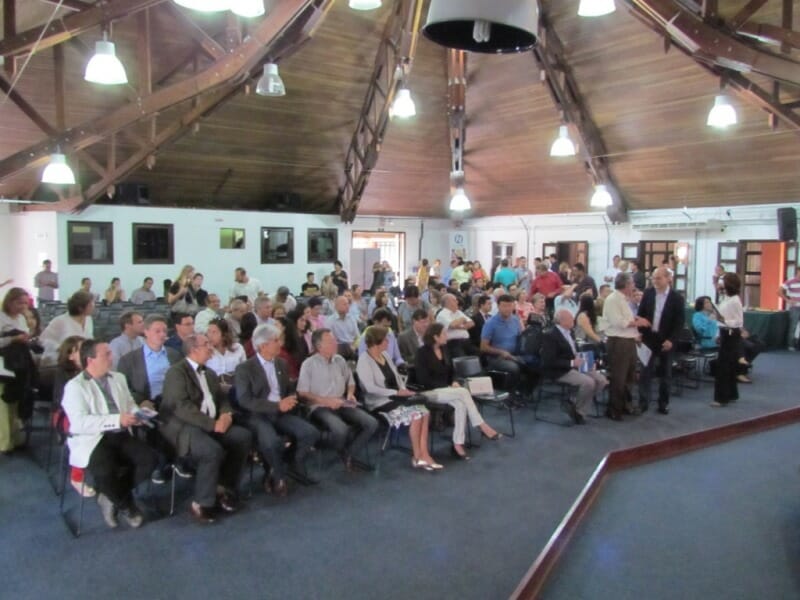
Mar 21, 2015 | Focolare Worldwide
 Saturday 14 March. The “Salão dos Atos” hall immersed in the greens of the Curitiba Barigui Park, was filled with Federal and State Deputies, Mayors, Councillors, Public Officers, youth and academics who came from the Amazon, the Northeast, Brasilia and other cities of Brazil.
Saturday 14 March. The “Salão dos Atos” hall immersed in the greens of the Curitiba Barigui Park, was filled with Federal and State Deputies, Mayors, Councillors, Public Officers, youth and academics who came from the Amazon, the Northeast, Brasilia and other cities of Brazil.
Unusual words echoed in the meeting hall: politics was presented as the “ love of loves” which urges Public Administrators to create projects that respond to the demands of the communities and gives citizens the possibility to achieve their own aspirations.» They all were reminded that «power that enforces but it is love that confers authority.» The word “fraternity” was often repeated, not only as the ethical principle of politics but as “its very substance.” These were the central points of Chiara Lubich’s thought which Maria Voce, President of the Focolare, cited in her message and which were deepened in the various speeches.
This vision of politics that Chiara herself had proposed years ago in the parliaments of the various countries, appeared today like a light in the crisis tunnel Brazil is undergoing. It stirred up new hope, because many testimonials testified to its implementation not only in Brazil, but also in other countries. An innovative panorama, presented in a documentary-video at the start of the event promoted by the Political Movement for Unity (MPPU) of the Focolare, on Chiara’s
The meeting took place simultaneously with two popular manifestations of opposite beliefs and many of the interventions underlined the political, economic and ethical crises, stressing the growing lack of faith in the institutions. «We have come as mediators, called to change this situation through dialogue and fraternity,», said Sergio Previdi, National President of the MPPU.
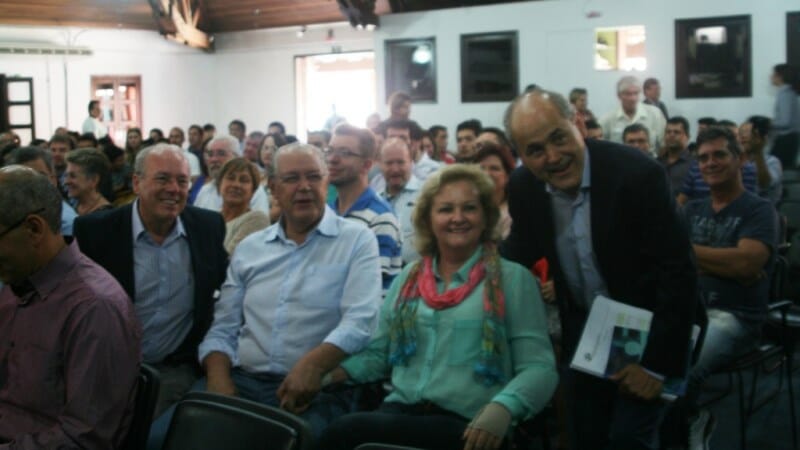 «This is a great challenge. Democracy is not only a technical fact, but needs a soul, We have to re-think politics in order re-humanize it,” affirmed Gustavo Fruet, Mayor of Curitiba. And he cited the innovative political culture of Chiara, which inspired the 2010-2030 programme to make Curitiba “a global innovator city,” already recognised as a model of sustainable planning and as the city of fraternity ».
«This is a great challenge. Democracy is not only a technical fact, but needs a soul, We have to re-think politics in order re-humanize it,” affirmed Gustavo Fruet, Mayor of Curitiba. And he cited the innovative political culture of Chiara, which inspired the 2010-2030 programme to make Curitiba “a global innovator city,” already recognised as a model of sustainable planning and as the city of fraternity ».
Many of the speeches of Councillors and Deputies of various political parties that try, not without effort, to actuate a politics that goes against the current, testified to how they draw from MPPU a “new strength and new commitment.”
«Fraternity means implementing a strategy of unity, seeking dialogue between the majority party and the opposition between institutions and societies, in the mutual effort to achieve common good», affirmed the Mayor of Sorocaba, Antonio Carlo Pannunzio.
Julio Carneiro of MPPU Brazil, mentioned the citadels founded by Chiara Lubich (more than 20as of today), as model-structures of a city, to testify to the impact fraternity has on civil coexistence..
«A new political culture that calls for new men and women», affirmed Prof. Marconi Aurélio Silva, highlighting the urgent need to train the youth in active citizenship, based on fraternity: «given that we are by nature relational beings and not isolated individuals » And he spoke of the many results achieved by the Civitas School in many states of Brazil and the world.
For further information consult: www.mppu.org.br – www.focolares.org.br
Mar 20, 2015 | Focolare Worldwide
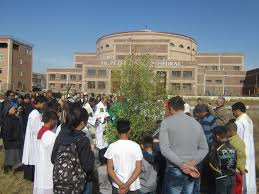
Mar 19, 2015 | Focolare Worldwide
 It is more than ten hours by plane from the Mongolian capital, Ulan Bator, to Daejeon, South Korea, but both cities belong to a single diocese. Outside the capital, the population density of Mongolia is two inhabitants per square kilometre. Christians comprise 2% of the population in a land with a Buddhist tradition of thousands of years (53%) and widespread atheism (29%).
It is more than ten hours by plane from the Mongolian capital, Ulan Bator, to Daejeon, South Korea, but both cities belong to a single diocese. Outside the capital, the population density of Mongolia is two inhabitants per square kilometre. Christians comprise 2% of the population in a land with a Buddhist tradition of thousands of years (53%) and widespread atheism (29%).
As the local church was wondering how it would care for the few Christians, it turned to the New Famlies of the Focolare Movement for help, finding that several Korean families were willing to share the Gospel message along with their witness to the spirituality of unity as it is lived in families. The parish of Ulan Bator has a social centre that welcomes children and teenagers for after-school programmes, a community farm and a free clinic. This is where the Focolare carries out its main mission. Let’s see what that mission is.
Two or three couples from Korea travel regularly to Mongolia, to visit parishes and meet with families. The main topic is families and how they apply the Gospel to their daily lives. This has brought about the transformation of couples and families in that land as well. They also meet with young people.
“Once, we brought medicines,” Cedam recounts. “The joy of the reverend sister was indescribable when we handed her the package: they were exactly the medicines she had been looking for, since her own had run out. Winter lasts for half the year in Mongolia. For months the temperature reaches -40°C, and so it is quite difficult to leave one’s home in search of the necessities. As the day approaches for our visit to Mongolia, the other families in the community gather provisions that can be taken along. One time we thought of taking footballs and basketballs so that the boys could play on the wide plains, but we needed to buy them and then there was the problem of geting them on the plane. . . One family had placed a money box in its shop to collect funds for the Mongolian families, and so we were able to buy not only balls, but also the equipment for inflating them.”
“The bishop is our driver,” Andrea continues. “He welcomes us at the bishop’s house, drives us to the parishes and encourages us to give with open hands our experiences as Christian families. We find that this is what families are most waiting to hear. The more we visit them, the more affection they express when we go back again. They also want to share how they have been living the Gospel. During one homily, in the presence of several congregations of sisters, the bishop said that we had been sent by God as misionaries and, calling us each by name, he described us as: my friends. Whenver we leave Mongolia, we feel like we are leaving a piece of our hearts behind. Because every time it’s like an experience of what the first Christian communities must have been like.”
![Step by step]()
Mar 18, 2015 | Non categorizzato
In 1968 a race towards heaven by a young girl who found the secret of happiness. Her cause for beatification is currently underway.  Sixteen years old and always on the move. At breakneck speed. Her destination: heaven. Maria Orsola Bussone (October 2, 1954-July 10, 1970) came from Piedmonte, Italy. She loved the pop music of the 1960’s and was interested in student protests. She played guitar and was taking voice lessons. A teenager like all the others, she was in love with nature, sport and music. She jotted down some of her thoughts in a diary, had many friends and wrote letters to the closest ones. She was the simple daughter of an old world that seemed on the verge of being overthrown by the winds of modernism. But her apparently serene life as the child of a tiny village in the Alps of Piedmonte, was hiding an extraordinary soul. A clear and genuine faith. With the support of their priest, and spirituality that gave her a head start, together with other friends, she brought to fruition the guidlines of the Second Vatican Council. Mariolina went into fourth gear and, in a short time, went through all the stages. In 1968 she was invited by the priest don Vincenzo Chiarle to take part in the first Gen congress, the new generation of the Focolare Movement. There Chiara Lubich presented to the youths of the 60’s another revolutionary model: that of a just man, who allowed himself to be immolated for the liberation of others. He also had his program: “That all be one”. Maria Orsola was fascinated, and this became the light of her life. When she was sixteen years old, her young life came to an abrupt end. But she left a stream of light behind her. She once revealed that she would give up her life, if that would help young people to discover God’s beauty. “And God took her at her word”, said John Paul II, speaking to thousands of her fellow citizens in Turin in 1988: “She accepted to transform her life into a gift, not a selfish possession” . “Hooray for life” was her motto.
Sixteen years old and always on the move. At breakneck speed. Her destination: heaven. Maria Orsola Bussone (October 2, 1954-July 10, 1970) came from Piedmonte, Italy. She loved the pop music of the 1960’s and was interested in student protests. She played guitar and was taking voice lessons. A teenager like all the others, she was in love with nature, sport and music. She jotted down some of her thoughts in a diary, had many friends and wrote letters to the closest ones. She was the simple daughter of an old world that seemed on the verge of being overthrown by the winds of modernism. But her apparently serene life as the child of a tiny village in the Alps of Piedmonte, was hiding an extraordinary soul. A clear and genuine faith. With the support of their priest, and spirituality that gave her a head start, together with other friends, she brought to fruition the guidlines of the Second Vatican Council. Mariolina went into fourth gear and, in a short time, went through all the stages. In 1968 she was invited by the priest don Vincenzo Chiarle to take part in the first Gen congress, the new generation of the Focolare Movement. There Chiara Lubich presented to the youths of the 60’s another revolutionary model: that of a just man, who allowed himself to be immolated for the liberation of others. He also had his program: “That all be one”. Maria Orsola was fascinated, and this became the light of her life. When she was sixteen years old, her young life came to an abrupt end. But she left a stream of light behind her. She once revealed that she would give up her life, if that would help young people to discover God’s beauty. “And God took her at her word”, said John Paul II, speaking to thousands of her fellow citizens in Turin in 1988: “She accepted to transform her life into a gift, not a selfish possession” . “Hooray for life” was her motto.

Since 2 October 2004, Maria Orsola’s remains repose in the Parish Church of Vallo Torinese.


 Chiara was ever faithful to her Church. And in this conviction, she felt the drama of the division, of the impossibility to receive from the same Chalice.
Chiara was ever faithful to her Church. And in this conviction, she felt the drama of the division, of the impossibility to receive from the same Chalice.










